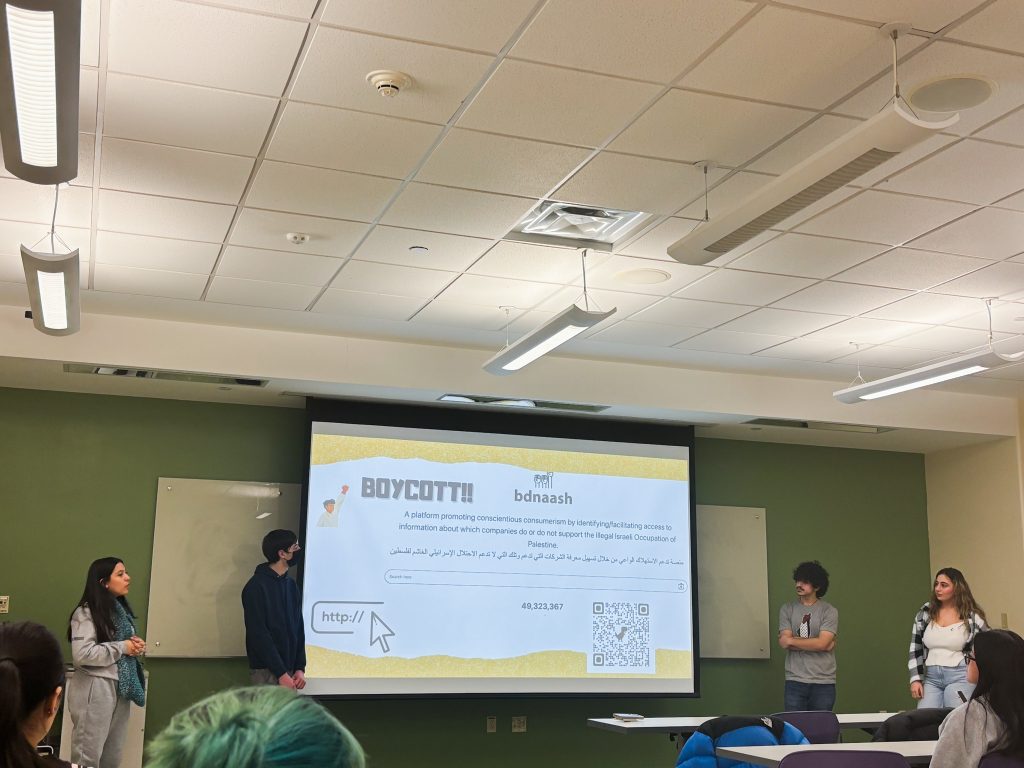Amid growing international concerns about the humanitarian crisis in Gaza, two campus organizations held an event last Tuesday, educating students about South Africa’s genocide case against Israel at the International Court of Justice (ICJ).
It was led by Binghamton University’s Students for Justice in Palestine (SJP), an activist group advocating the aspirations of the Palestinian people, and Thurgood Marshall Pre-Law Society (TMPS), an organization dedicated to the empowerment of all students to advance in the legal profession and combat worldly injustices.
“Before TMPS reached out to us to collaborate for an event regarding South Africa’s claims against Israel, which countless countries and civil society organizations have supported, we thought it important to call attention to this and inform people of the genocide and growing humanitarian crisis,” SJP’s E-Board wrote. “In the age of social media and the dystopian reality of viewing a genocide through our phones, many of us have felt helpless, but the shifting of the public image reminds us of just how crucial in this moment education and advocacy are for Palestinians in Gaza and the diaspora.”
The ICJ case originated in late December, when South Africa formally accused Israel of committing genocide during its military campaign in Gaza following the Oct. 7 Hamas attack. Israeli lawyers, before a 17-judge panel, argued that the accusations were “profoundly distorted” and that Hamas was to blame for the growing civilian death toll — which has surpassed 28,400 as of 3:29 p.m. on Feb. 14, according to NBC News.
Held in the University Union, the event drew over 40 attendees. Leaders from both organizations showed a presentation separated into four sections — background, the Genocide Convention, case facts and the verdict. The convention was the first human rights treaty adopted by the United Nations General Assembly in 1948 and was ratified by 153 countries, including Israel and South Africa.
“As a multicultural social justice organization, we believe that it is our responsibility to speak out against injustices and mass atrocities,” TMPS’s E-Board wrote in an email. “As people of color [(POC)], we recognize oppression and colonization. The POC struggle intersects with the Palestinian struggle. We thought it was extremely important to educate the student body on international law and how much power it holds in such extreme situations.”
South Africa’s case centered around the incendiary and dehumanizing rhetoric of top Israeli officials, including Prime Minister Benjamin Netanyahu, Defense Minister Yoav Gallant, President Issac Herzog and National Security Minister Itamar Ben-Gvir. Its legal team also alleged genocidal crimes committed by the Israel Defense Forces, including the indiscriminate killing of Palestinians, causing serious mental and bodily harm and creating conditions meant to physically destroy an ethnic group. Organizers played a clip of South Africa’s opening arguments.
“The calls of Palestinians to end Israeli war crimes that keep Palestinians subordinate have only grown louder and more numerous,” SJP’s E-Board wrote. “However, even with growing support, many within the international community, even within states that sympathize with the plight of Palestinians, have found immense trouble meaningfully opposing the genocide in Gaza right now. Many scholars argue for the inclusion of ethnic cleansing into the definition of genocide under the genocide convention, and we thought it important to depict in many ways how meek American projections of the state’s value of ‘human rights’ [are] extremely limited and only apply to states that America considers to be ‘the enemy.’”
Israel’s lawyers asked the court, the UN’s highest judicial body, to reject South Africa’s arguments on the grounds of self-defense and its evacuation warnings directed at Palestinian civilians, emphasizing the government’s commitment to international law. They argued that it was Hamas, not Israel, that sought to commit genocide.
For decades, support for unconditional military aid to Israel in the Capitol has been bipartisan and noncontroversial. On the international stage, the United States has vetoed a binding UN Security Council resolution calling for a cease-fire in Gaza.
On Jan. 26, the court ordered Israel to prevent genocidal acts in Gaza, though it did not call for an immediate cease-fire, as demanded by South Africa. Of the six provisional measures approved, most passed with a 15 or 16-judge majority — Julie Sebutine of Uganda objected to each one and Aharon Barak of Israel, appointed ad hoc, objected to four.
“Where international courts and the United Nations have failed to bring about immediate relief to citizens in Gaza, we can only rely on continuing to apply pressure through the methods we know, and the Israeli government continues to lobby for many uninformed citizens’ time and attention through public diplomacy,” SJP’s E-Board wrote. “In a lot of senses, Israeli hasbara, or Israeli policy on public diplomacy to influence citizens of both their own and other countries to approve of the Israeli government’s choices and actions publicly, has successfully depicted Palestinians as ‘aggressors’ or ‘violent barbarians’ in many social spheres.”
The ICJ has no functional ability to enforce its ruling, a fact noted by Netanyahu shortly before the verdict in a speech, where he said “nobody will stop us — not The Hague, not the axis of evil and not anyone else,” referring to the court’s metonymic host city. The presentation added that the case would take years to reach a full resolution.
SJP’s E-Board shared the event’s goals, offering a message of hope to Palestinian advocates, on campus and beyond.
“We hoped to drive the message home to attendees of the event that, no matter how many times we may be failed, whether it be by leaders [on BU’s] campus or supposedly ‘unbiased’ mediators, we as Palestinians, Palestinian advocates and supporters of human rights inherently have the power to affect change positively in innumerable ways.”



